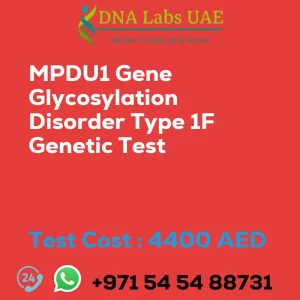GBE1 Gene Glycogen storage disease type 4 Genetic Test
Test Name: GBE1 Gene Glycogen storage disease type 4 Genetic Test
Components: NGS Technology
Price: 4400.0 AED
Sample Condition: Blood or Extracted DNA or One drop Blood on FTA Card
Report Delivery: 3 to 4 Weeks
Test Type: Metabolic Disorders
Doctor: General Physician
Test Department: Genetics
Pre Test Information: Clinical History of Patient who is going for GBE1 Gene Glycogen storage disease type 4 NGS Genetic DNA Test. A Genetic Counselling session to draw a pedigree chart of family members affected with Glycogen storage disease type 4.
What is GBE1 Gene Glycogen storage disease type 4 Genetic Test?
The GBE1 gene is responsible for providing instructions to produce the enzyme glycogen branching enzyme. Glycogen storage disease type 4 (GSD4), also known as Andersen disease, is a rare genetic disorder caused by mutations in the GBE1 gene.
NGS Technology and Genetic Testing
NGS (Next-Generation Sequencing) genetic testing is a type of genetic test that uses advanced sequencing technologies to analyze multiple genes simultaneously. It allows for the detection of various genetic variations, including small point mutations, deletions, insertions, and rearrangements, in a more efficient and cost-effective manner compared to traditional sequencing methods.
In the context of GSD4, NGS genetic testing can be used to identify mutations in the GBE1 gene that are associated with the disease. This can help in confirming a diagnosis, assessing the risk of passing on the condition to offspring, and providing information for genetic counseling.
The Process of NGS Genetic Testing
NGS genetic testing may involve obtaining a DNA sample from the individual undergoing testing, typically through a blood sample or a cheek swab. The DNA is then sequenced using NGS technology, and the resulting data is analyzed to identify any mutations or genetic variations in the GBE1 gene.
It is important to note that NGS genetic testing is a complex process, and the results should be interpreted by a qualified healthcare professional or genetic counselor who specializes in genetic testing and rare genetic disorders like GSD4. They can provide a detailed explanation of the test results and discuss any implications for the individual and their family.
| Test Name | GBE1 Gene Glycogen storage disease type 4 Genetic Test |
|---|---|
| Components | |
| Price | 4400.0 AED |
| Sample Condition | Blood or Extracted DNA or One drop Blood on FTA Card |
| Report Delivery | 3 to 4 Weeks |
| Method | NGS Technology |
| Test type | Metabolic Disorders |
| Doctor | General Physician |
| Test Department: | Genetics |
| Pre Test Information | Clinical History of Patient who is going for GBE1 Gene Glycogen storage disease type 4 NGS Genetic DNA Test A Genetic Counselling session to draw a pedigree chart of family members affected with Glycogen storage disease type 4 |
| Test Details |
The GBE1 gene is responsible for providing instructions to produce the enzyme glycogen branching enzyme. Glycogen storage disease type 4 (GSD4), also known as Andersen disease, is a rare genetic disorder caused by mutations in the GBE1 gene. NGS (Next-Generation Sequencing) genetic testing is a type of genetic test that uses advanced sequencing technologies to analyze multiple genes simultaneously. It allows for the detection of various genetic variations, including small point mutations, deletions, insertions, and rearrangements, in a more efficient and cost-effective manner compared to traditional sequencing methods. In the context of GSD4, NGS genetic testing can be used to identify mutations in the GBE1 gene that are associated with the disease. This can help in confirming a diagnosis, assessing the risk of passing on the condition to offspring, and providing information for genetic counseling. NGS genetic testing may involve obtaining a DNA sample from the individual undergoing testing, typically through a blood sample or a cheek swab. The DNA is then sequenced using NGS technology, and the resulting data is analyzed to identify any mutations or genetic variations in the GBE1 gene. It is important to note that NGS genetic testing is a complex process, and the results should be interpreted by a qualified healthcare professional or genetic counselor who specializes in genetic testing and rare genetic disorders like GSD4. They can provide a detailed explanation of the test results and discuss any implications for the individual and their family. |








